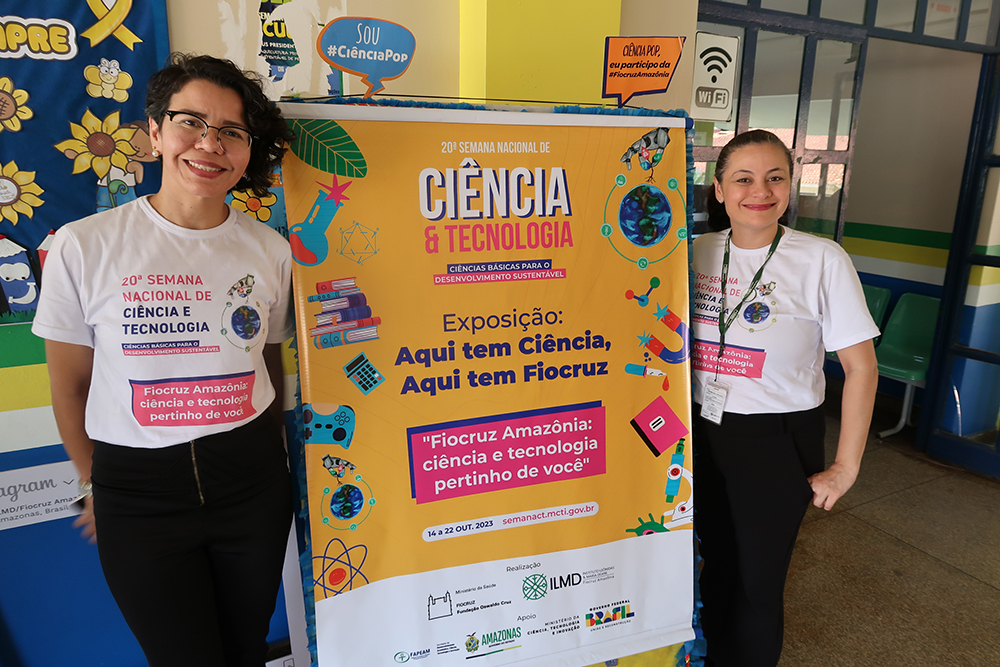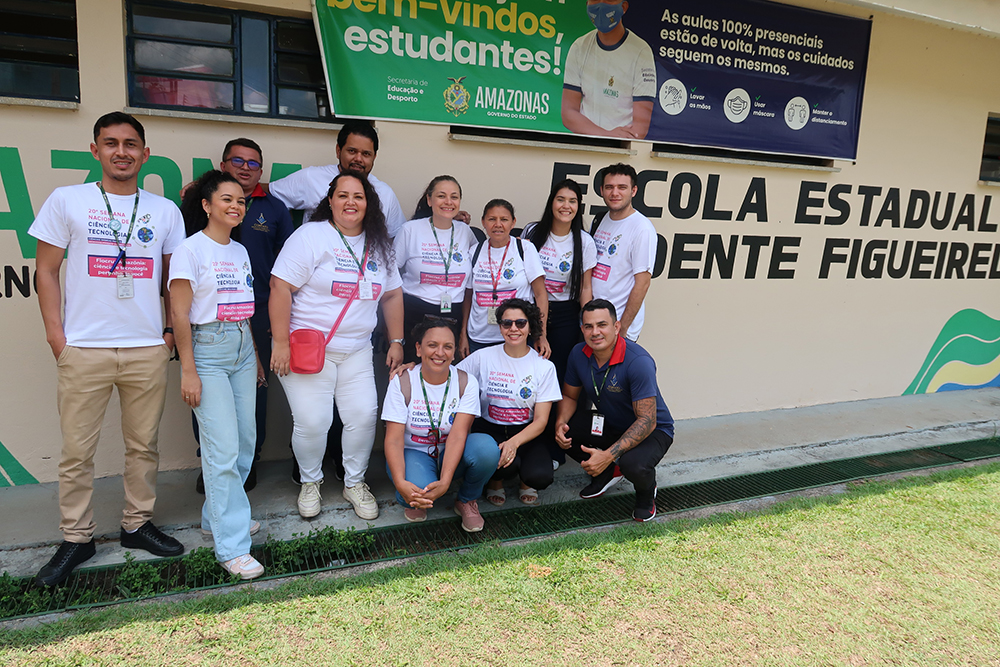Image: Disclosure
The Leonidas and Maria Dean Institute (ILMD/Fiocruz Amazônia) concluded the programming of the 20th National Science and Technology Week (SNCT-2023), implementing the activities of the Pop Science Project-ILMD/Fiocruz Amazônia: Mainstreaming Science in Health through Digital Tools, funded by the Foundation Amazonas State Research Support (Fapeam), for students at the Presidente Figueiredo State School, in the Aida Nascimento neighborhood, Presidente Figueredo municipality, Manaus Metropolitan Area. The activities took place over the course of last Friday, October 20, in which primary and secondary school students participated, and with the participation of teachers.
The 20th SNCT of Fiocruz Amazônia also organized activities to the Municipality of Tabatinga, in Alto Solimões, and to the Center for Jungle Warfare Education (CIGS) and the Castelo Branco State School, in Manaus, addressing different aspects of the scientific production of Fiocruz Amazônia, with lectures, conversation circles and games Educational, video presentations and podcasts from DigiCiência and OuvirCiência workshops, developed by Ciência Pop. The SNCT was organized by several sectors and laboratories in Fiocruz Amazônia to develop activities, between 16 and 20/10.
At the President Figueiredo State School, the videos entitled “Science and Health in the Amazon”, “Ciência Pop” and “Inova POP” were shown. In addition to dialogue sessions on the topics “Vaccines”, with PhD in Biotechnology from the Graduate Program in Biotechnology at the Federal University of Amazonas Kesia Caroline Alves, and “Using Animal Models in Science”, with MSc in Biotechnology Caio Coutinho de Souza.
Interim Director of Fiocruz Amazônia, Stephanie Lopez, participated in the dialogue sessions, praising the importance of scientific research and SNCT as a means to spread scientific publishing in the country.
“Science is present in everything, in various professions, in physics, biology, health, and computing, but at the same time it is very far away, and hence the importance of the initiative to create the National Science and Technology Week, precisely to take the world outside the laboratory and make it go to the streets, to the schools, and speak to Residents and tells them why science is important. “We need you to understand this, so that research projects become public policy and get funding,” Stephanie explained to the students.
Vaccines
In talking about vaccines, students were able to see how vaccines work and their importance to the health of society in general. The lecture discussed the different types of vaccines available and the importance of updating vaccination records for people of all age groups.
The most frequent doubts among students were related to the efficacy of vaccines and some vaccine-preventable diseases, such as COVID-19, measles, and meningitis.

Image: Disclosure
Animals in science
In the Animal Models in Science lecture, the historical aspects, practice, current status and future perspectives of the use of animals in science are presented, and how models have been fundamental to scientific progress, from understanding diseases to developing innovative treatments.
Students also participated in the SDG Games: Health and Sustainability, which consists of learning about the goals of the Millennium Goals of the 2030 Agenda, and relating them to the reality of the school or community; Heliana Wants to Be a Scientist is a Monopoly style game, where participants discover the world of science, follow a path, roll dice, and jump over spaces representing the different stages of a scientist’s training.
“Heliana in the game is designed to be an Amazonian girl who learns her first lessons about science on her grandmother’s farm, and then uses curiosity as the driving force for her discoveries about the world of science. “This is the story of many of our scientific students, master’s and doctoral students,” explains the researcher at the Laboratory of History and Public Health Policies (LAHPSA), in Fiocruz Amazonia, Fabian Vienenti, who accompanied the students in the dynamics.
For the principal of Presidente Figueiredo State School, Ronald Oliveira, the activities developed by Fiocruz Amazonia were very important for the students. “It is a fact that our country lacks activities that awaken scientific competence in students. Welcoming Fiocruz Amazônia to our school is an honor and a great opportunity for students to communicate with these topics through exhibitions and lectures.
Educator Camila da Cruz Henrique highlighted that SNCT provided the opportunity to do activities outside the school routine. “What Fiocruz Amazônia has brought us is something new for the students. They realize the importance of science and it can lead them to start researching, be more curious and develop new behavioral aspects and skills.

“Hardcore beer fanatic. Falls down a lot. Professional coffee fan. Music ninja.”







More Stories
The law allows children and adolescents to visit parents in the hospital.
Scientists pave the way for the emergence of a new element in the periodic table | World and Science
Can dengue cause hair loss? Expert explains how the disease affects hair